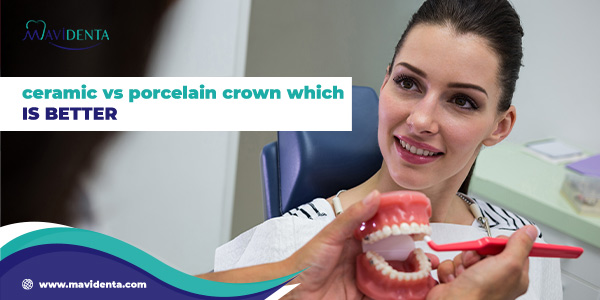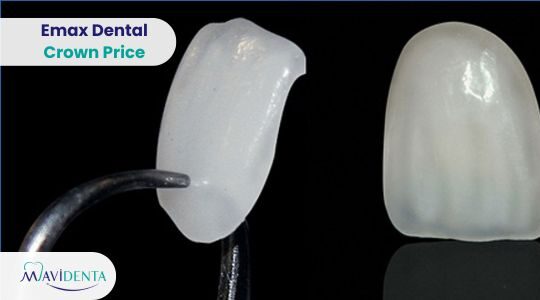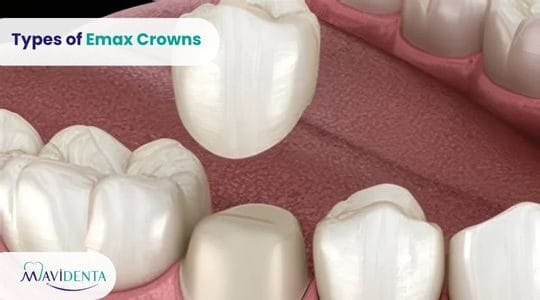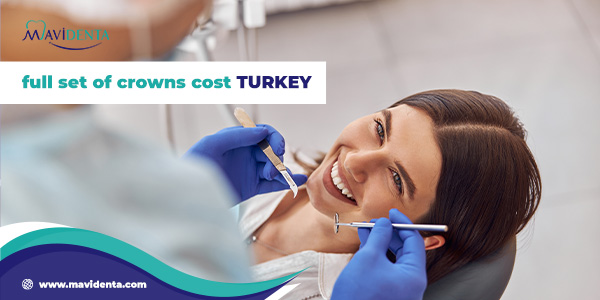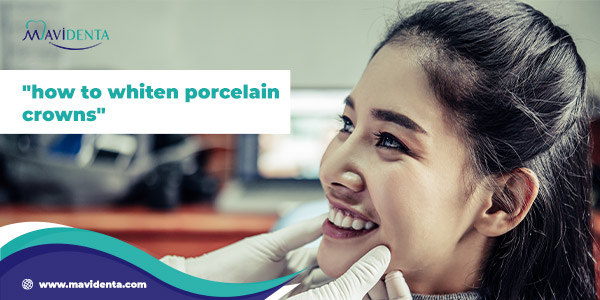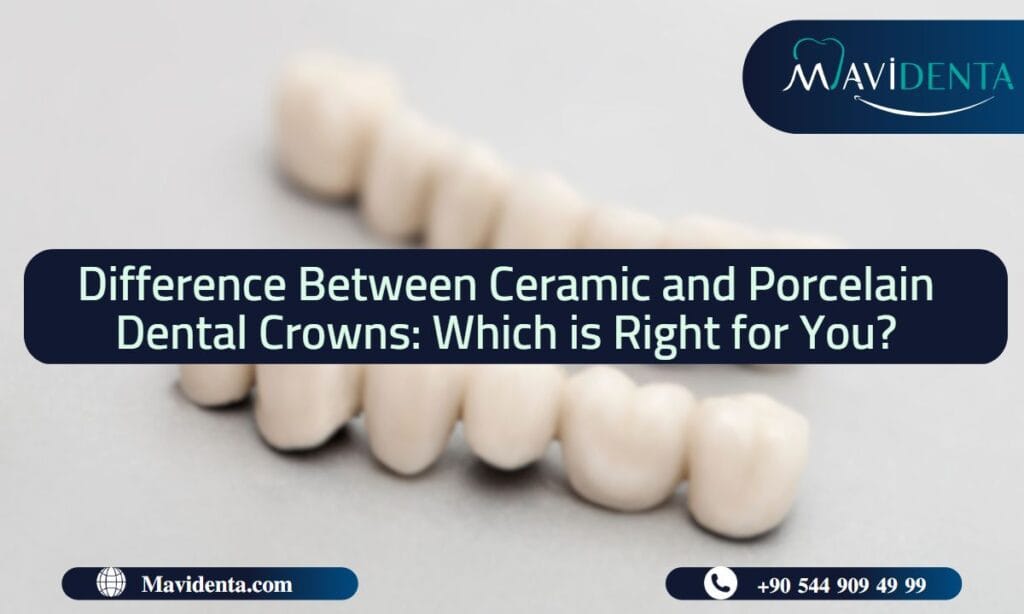The great development in cosmetic and therapeutic dentistry has opened the door of hope to many people who suffer from various dental problems. Until recently, these problems did not have an effective treatment. Among these problems are partially or completely damaged teeth due to tooth decay, tooth breakage, or tooth change.
Their shape and color were permanently damaged, and it was difficult to restore teeth’ shape, function, and color until this development began to catch up with the manufacture of various dental implants. In the following lines, we will discuss ceramic vs porcelain crown which is better.
Ceramic Crowns:-
Ceramic crowns are thin, hollow shells in the shape of natural teeth that are installed over the entire damaged tooth or entire teeth that are placed over dental implants.
They are made of dental ceramic, which is a soft white material whose chemical composition includes one or more metals such as aluminum, in addition to several non-metallic materials such as silicon and boron.
And oxygen, and its color can be easily adjusted to match the natural color of enamel and shaped according to the tooth’s fingerprint.
Composition and Characteristics:
The types of ceramic crowns vary according to the manufacturing technique and the amount of pressure and heat used during manufacturing, in addition to the different materials that are added to the ceramic.
All of this results in different types of ceramics in strength, use, and cost. But for simplicity, we mention the most famous basic types used in ceramic crowns, which are:
- Metal-ceramic crowns: These are crowns whose core is made of metal and the outer part of which is made of ceramic. They are often used in the back teeth used for grinding food, but the metal gives the teeth a dark color and may interact with the gums, causing sensitivity and turning them dark blue.
- All-ceramic crowns (all ceramic teeth): Based on their name, these crowns are made of ceramic material only, without the use of metal, by exposing the ceramic to high pressure and heat to become strong and solid and do not break easily. Their uses are primarily aesthetic, usually in the front teeth.
- Ceramic crowns that contain zirconium: These are among the best dental crowns currently used because zirconium is hard and has a light color, meaning it is close to natural teeth in form and function.
Advantages:
Before we discuss ceramic vs porcelain crown which is better? Ceramic crowns solved many of the problems that were caused by other types of dental crowns, such as sensitivity to the metal included in the manufacture of the crown and the inconsistency of the color of the crown with the original tooth color.
- Ceramic crowns are biocompatible with the gums and do not cause sensitivity like dental crowns that are made of metal, so they are installed successfully and are not rejected by the gums.
- The ceramic material is light and does not cause stress or damage to the natural teeth and gums, and the flexibility in its shaping and coloring makes its appearance completely natural.
- In addition to its aesthetic effect, its therapeutic effect is the main one. It helps in replacing missing teeth, partially broken teeth, or completely damaged due to decay.
- These teeth regain their functions naturally once ceramic teeth are installed on them. They are also chemically stable and resistant to corrosion, which makes them live long.
- The material is originally ceramic. It is a poor conductor of heat, meaning it will not be affected by cold or hot foods.
Limitations:
Despite the problems it solves, there is still a slight possibility of harm occurring in a few cases, and its potential harms are:
- The possibility of sensitivity in the original teeth (Dental allergies) as a result of reshaping them, reducing their thickness, and cooling the tooth enamel, and this possibility does not exist in the case of dental implants.
- In rare cases, cracks may occur in ceramic teeth, and then they must be replaced, or the teeth may move, giving the opportunity for bacteria to accumulate underneath them.
Explore What’s The Difference Between Zirconia And Porcelain Crowns?
Porcelain Crowns:-

Speaking of ceramic vs porcelain crown which is better. Porcelain crowns are dental crowns made entirely of ceramic material. It can be an excellent alternative for patients looking for a long-lasting, natural dental restoration; Because they are made to closely mirror the appearance of natural teeth.
Porcelain crowns are usually recommended for highly visible teeth, such as front teeth. Because it provides excellent aesthetics and a natural appearance. It is also an ideal choice for patients with sensitive teeth, or who suffer from allergies to metals because it does not contain any metal.
Porcelain crowns are an excellent option for patients with tooth decay and large fillings. Prosthetic dental treatments such as crowns are no less important than dental implants.
Composition and Characteristics:
- Porcelain Crowns are always designed later according to each patient’s condition. Dentists at Mavidenta Center take impressions of the patient’s teeth and then send them to the laboratory to make the crown.
- This process may take between 4 to 7 working days, and our dentists also place a temporary crown for the patient during this period.
- When the new crown is ready, the patient will have to return to the center for doctors to install it. Applying a crown in the mouth is often simple, easy, and painless. Dentists use a special type of cement to permanently attach the new crown to your teeth.
Advantages:
Porcelain crown treatments offer many advantages over other types of dental crowns:
- Aesthetics: Porcelain crowns are highly aesthetic and can closely resemble the appearance of natural teeth. Therefore, it is an excellent choice for patients looking for a natural and long-lasting dental restoration.
- Biocompatibility: Porcelain is biocompatible. This means it is unlikely to cause allergic reactions or sensitivity problems in patients with sensitive teeth or allergies to metals.
- Durability: Porcelain crowns are strong and durable and can last for many years with proper care; This is because they are not temporary crowns, but permanent crowns.
- Less sensitivity to heat and cold: Porcelain crowns provide excellent insulating properties, reducing heat and cold sensitivity in patients’ ice chewing.
- Stain Resistance: Porcelain dental crowns are highly stain resistant. This makes porcelain crowns an excellent choice for patients who suffer from color-matching problems, or from tooth discoloration or staining, to maintain their natural color.
In general, porcelain crown treatments are a good option for most patients; Because they offer excellent aesthetic appeal, durability and biocompatibility. This makes it an ideal choice for patients looking for natural teeth and long-term dental restoration.
Limitations:
Taking care of the porcelain crown after it is installed is very important. You can extend the life of your porcelain crown by taking proper care of it, such as:
- You should not consume anything during the first hour after installation. This may change depending on the adhesives applied between the crown and the tooth.
- Some sticky substances can be eaten immediately afterward. However, it is recommended to eat food at least one hour after the installation procedure.
- In some cases, tooth pain may occur after a porcelain crown is installed. Bleeding gums are normal after a crown is placed. However, long-term bleeding gums and food debris between the crown and teeth can cause pressure on the gums and tooth decay.
- Sensitivity pastes can be used for tooth sensitivity after installing a porcelain crown. You should brush your teeth twice a day. You must use dental floss to clean and remove food residue between teeth and bridges. You should gargle twice a day after installing a porcelain crown.
- You should avoid very hot and cold food products and drinks. Hard objects can cause damage to the crown and may cause it to break, so you must be careful to consume soft products.
- Coffee and tea can cause a change in the color of the crown, so we advise you to use gargling after consuming substances that could cause the color of the crown to change and affect it.
- You must also be careful as much as possible to stay away from sticky and hard products such as chewing gum after installing porcelain crown
Zirconia Crowns vs Porcelain Fused to Metal: Which is Right?
Ceramic vs Porcelain Crown which is better:-
Speaking of ceramic vs porcelain crown which is better, it is worth noting that each type has its own characteristics that distinguish it from others. When we make a comparison between ceramic crowns and porcelain crowns.
We find that ceramic is characterized by an attractive appearance, while porcelain is distinguished by its durability and lower cost, so we will learn about ceramic vs porcelain crown which is better in the next paragraph.
Durability:
Speaking of ceramic vs porcelain crown which is better. Ceramic crowns are comfortable compared to other types of crowns and fit better on the teeth without the need for any adjustment. Ceramic crowns are made of soft tissue materials that help the gums grow back around the tooth.
Aesthetics:
In addition to ceramic vs porcelain crown which is better. Porcelain crowns give a white color and an appearance closer to natural teeth than any other type of crown.
Strength:
Porcelain coatings are strong and do not break easily.
Cost:
After we discussed ceramic vs porcelain crown which is better. The cost of porcelain crowns is low compared to other crowns. Moreover, ceramic dental implants are among the most long-lasting dental implants that can even be described as permanent, as they last for a period ranging from 5 to 15 years in some cases.
The lifespan of the crown depends on the amount of wear and tear it is exposed to. If the condition maintains Follow the instructions and do not suffer from any allergies to the crown. It will work perfectly and will not corrode until many years later.
The results also depend on the extent of adherence to the necessary level of care and hygiene, as the decision to install a dental covering does not mean not paying attention to its cleanliness.
Some believe that the teeth are now protected from decay or gum disease. Rather, the teeth must be brushed on a daily and regular basis, especially around the crown area where the tooth meets the gums.
It is also important to be careful and not use crowned teeth for vigorous activities such as chewing ice, opening packages, or biting nails.
Also check: How To Bond Zirconia Crowns To E-max?
Indications for Each Type:-
When discussing ceramic vs porcelain crown which is better, the matter inevitably requires intervention by the specialist doctor in charge of your treatment, as each type is used according to the patient’s condition and in accordance with the instructions of the specialist doctor, and this is what we will learn about in the following paragraph.
When to Choose Ceramic Crowns:
Ceramic crowns are usually used in the following cases:
- People who suffer from cracks in their teeth or a high tendency to decay may benefit from ceramic teeth to strengthen these teeth.
- It is used when installing dental bridges.
- People need to cover their teeth because the shape of the tooth is distorted or its natural color has changed.
- Ceramic teeth are installed over dental implants.
When to Choose Porcelain Crowns:
Porcelain Crowns can be used in the following cases:
- Prevent the fracture of weak teeth.
- Bringing parts of a broken tooth together.
- Replace broken or worn teeth.
- Support and cover the tooth with a large filling.
- Fixing the dental bridge in place.
- Hide misshapen or discolored teeth.
- Replacement of missing tooth when placed on dental implants.
- Treatment time for porcelain crowns.
Caring for Ceramic and Porcelain Crowns:-
- It is important to be aware of the responsibility of maintaining the coverings, which requires some precautions to keep them as long as possible.
- Negligence in taking care of it will cause it to break, which may cause you the trouble of installing a new one.
- Avoid biting and chewing your nails, or biting on all hard objects, such as pencils or ice, as strong pressure on the teeth may lead to them breaking.
- You should tell your dentist if your bite is incorrect, or if you do not feel that your upper and lower jaws are clenching together properly.
- Keep your teeth and gums clean by brushing and flossing every day.
Maintenance Tips:
The crown is installed on the tooth, and taking care of it becomes very important because it is the best way to preserve it and protect the mouth and teeth from various problems to which it may be exposed. This is done by following a set of procedures:
- Continue to brush your teeth well, at least twice a day, and brush them correctly by moving the brush from top to bottom for the upper teeth and from bottom to top for the lower teeth.
- Brush your teeth using floss on a daily basis to ensure thorough cleaning of your teeth.
- Refrain from eating hard foods such as chewing ice, etc., especially if the crown is made of porcelain.
- If you suffer from pressure on your teeth during sleep, your doctor may recommend using a device that prevents this.
- Temporary crowns need to be handled gently while brushing or flossing, in addition to the importance of relying on soft and soft foods so that they do not break or break.
Potential Risks:
In addition to ceramic vs porcelain crown which is better. There are several problems that an individual may face when crowning teeth, and the following are the most important harms of dental crowns:
1-Feeling discomfort and tooth sensitivity:
The individual feels increased tooth sensitivity, especially immediately after the dental crown procedure, and when the effect of the anesthetic begins to wear off.
When the tooth nerve is in place and dental crowns are performed, this causes increased tooth sensitivity to hot and cold drinks, and the doctor usually advises brushing the teeth with a special toothbrush for sensitive teeth.
The patient may also feel pain when biting food, and this is one of the harms of dental crowns resulting from the dentist covering the tooth to a higher level than necessary. Fortunately, this problem can be easily fixed by the dentist.
2-Suffering from a cracked crown:
Covering teeth with porcelain often causes them to crack, but small cracks can be easily repaired, as the doctor usually completely replaces the crown when large cracks occur.
3-Exposure to a loose crown:
One of the harmful effects of dental crowns is the loosening of the crown, as the material that the doctor uses to cover the teeth and stick the crown.
A loose crown leads to bacteria gathering and tooth decay. Therefore, you should consult a doctor immediately if you feel this matter.
4-Exposure to the crown falling:
The crown is vulnerable to falling out when crowning teeth, either due to tooth decay or because of the adhesive that was used.
When the crown falls off, you must clean its place well, and then see a doctor immediately.
The doctor can provide the patient with instructions on how to deal with a falling crown until the doctor’s appointment arrives. Usually, the doctor tries to return the crown to its previous place, or the teeth can be crowned again in some cases to avoid dental crown damage.
5-Suffering from an allergic reaction:
It is possible for the body to attack the dental crown, as porcelain is a material foreign to the human body, but this is rare.
6-Exposure to black lines:
Black lines can appear on teeth that have been crowned and near the gums. This is normal, as the black lines are part of the metal in the crown itself.
Sometimes the doctor replaces the entire crown in order to get rid of the black line appearing on the teeth.
Read more: Zirconia Crown Price Turkey: Affordable Smile Restoration
Choosing the Right Crown for You:-

Now that we have learned all the details of ceramic vs porcelain crowns which is better, you have become aware of the advantages and disadvantages of each type, so you can determine what is best according to your health condition and according to the instructions of the treating doctor. In addition, never forget that the doctor is the one who will choose and install the best type of crown that is appropriate for the condition of your teeth.
Consultation with Your Dentist:
Never forget to discuss with your doctor about ceramic vs porcelain crowns which is better, and do not be shy to ask any question that is on your mind about this matter, so make an appointment with your doctor and talk about all the details so that you stay informed of the procedures.
Personal Considerations:
There are some precautions that you must take into consideration before undergoing a dental crown installation, and among these procedures are the following:
- Your teeth and gums must be healthy before you can get veneers.
- Veneers are not always a good option if you are a patient who puts a lot of pressure on their teeth, because the thin veneer may chip or become damaged. Your dentist may suggest that you wear a plastic dental guard while sleeping.
- It is possible for the veneer to wear down over time, in this case, you may need to get a new one.
- Although the procedure is not very painful, expect to have a slight difficulty with chewing and speaking for the first two weeks until your new dental crowns fit into your mouth and your natural teeth function is restored.
- As with all dental care techniques, you should discuss all questions you have with your doctor.
Explore the Best Dental Implant Clinic in Istanbul?
Conclusion
At the end of the text, dental crowns may be a permanent or temporary solution to the dental problems that we experience in our lives, so we must choose the best types of crowns ever, and that is why we ceramic vs porcelain crowns which is better. In addition, do not forget that Mavidenta doctors will accompany you on your dental treatment journey. They will provide you with all the information and details you are looking for.
For any inquiries, feel free to Contact Our Clinic.
FAQ
Which is better ceramic or porcelain crown?
It is not possible to determine the preference of one type over the other, as each type has its own characteristics, but the one who determines the most appropriate type is the specialized dentist.
Is porcelain the same as ceramic dental crowns?
According to the components that go into the installation of ceramic and porcelain crowns, each type differs from the others in terms of composition and composition.
Which lasts longer, ceramic crowns or porcelain crowns?
Ceramic crowns are generally more durable and resistant to fracture compared to porcelain crowns, especially when placed on back teeth that endure strong biting forces. Porcelain crowns provide excellent aesthetics but may not be as long-lasting under heavy chewing pressure. In terms of durability and lifespan, ceramic crowns usually perform better on back teeth.
Which crown is more suitable for front teeth, ceramic or porcelain?
When the main goal is a natural and aesthetic smile, porcelain crowns are often the preferred choice because they closely mimic the color, shine, and translucency of natural teeth. This makes them highly suitable for front teeth. On the other hand, ceramic crowns are stronger, making them more suitable for molars and premolars.

